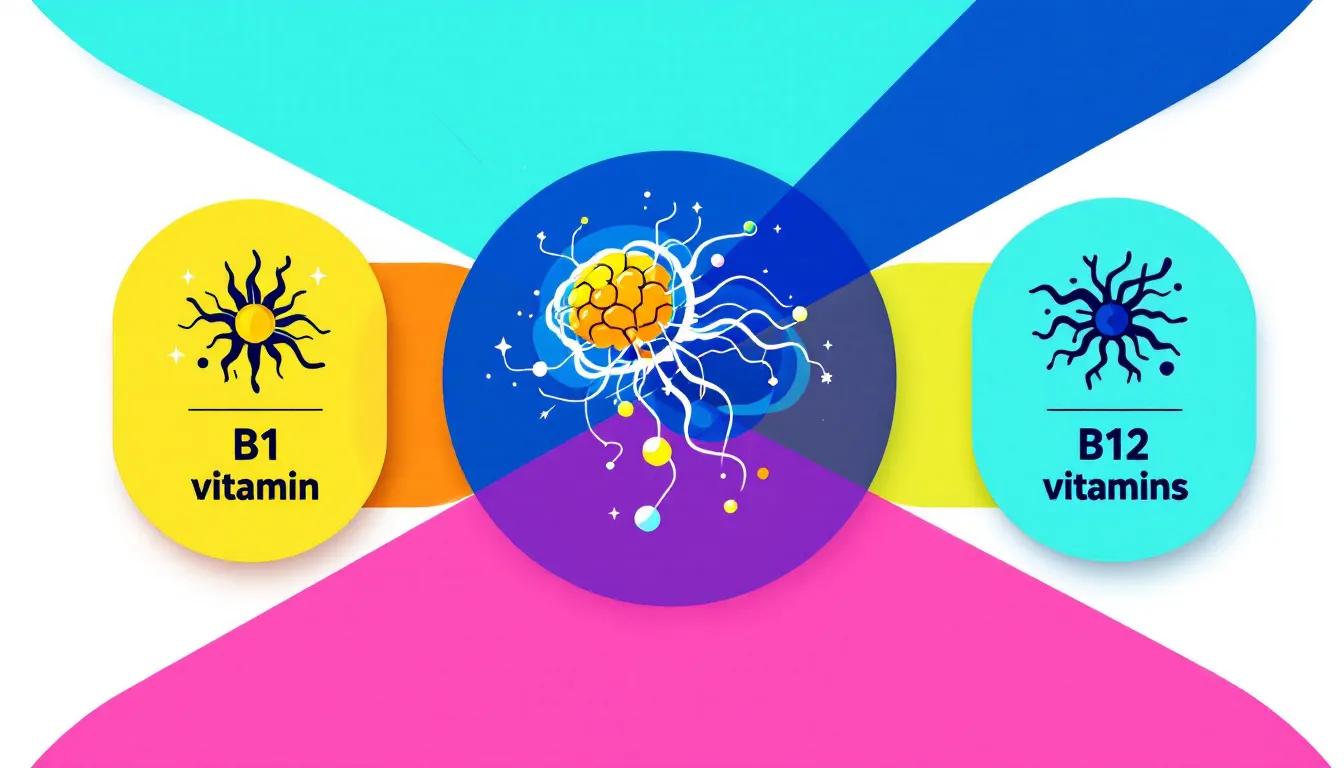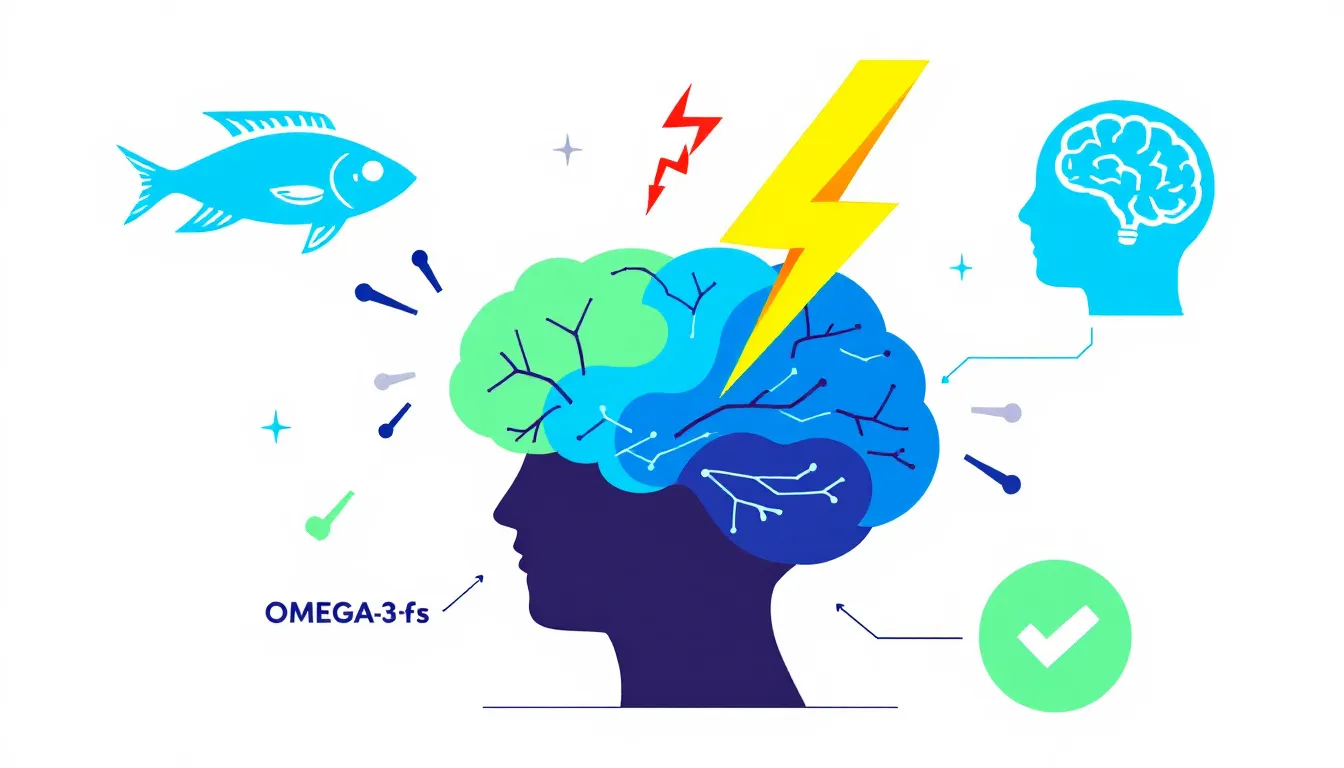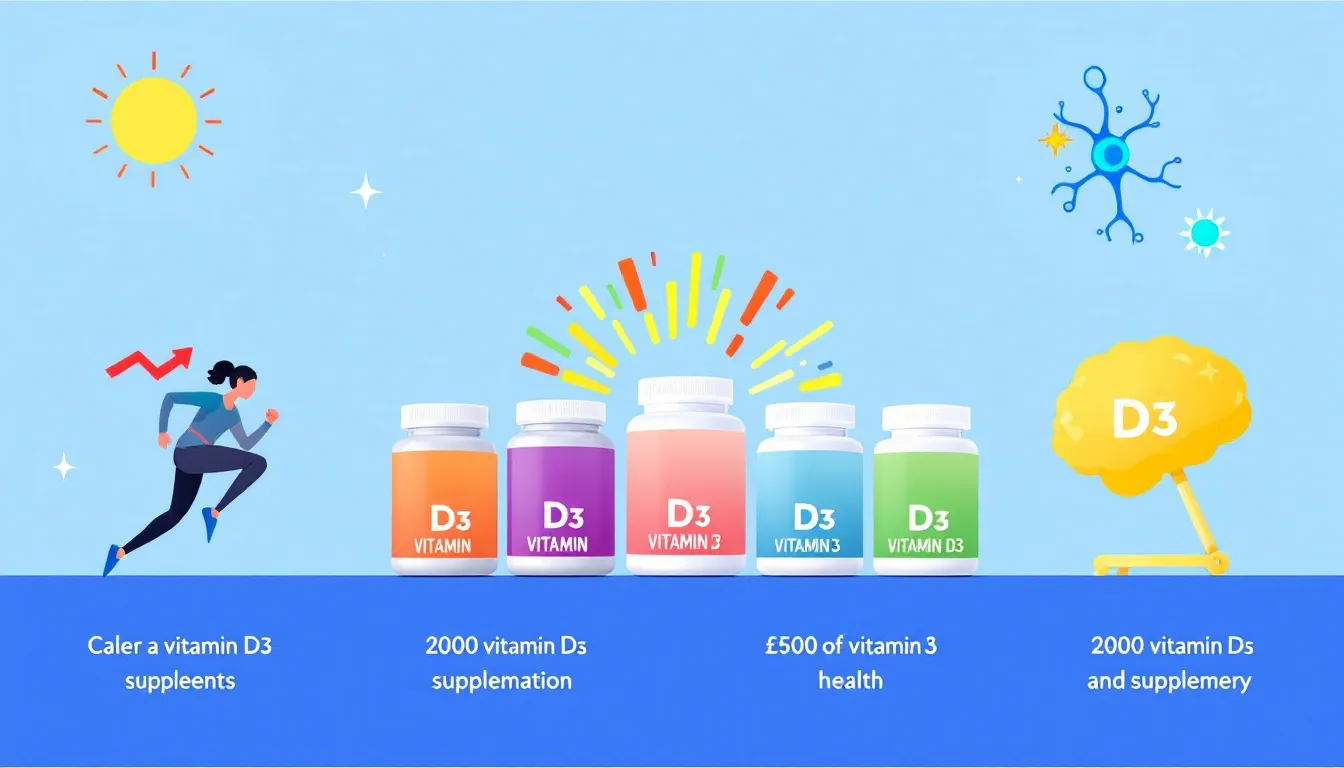Your basket is currently empty!
Maintaining a healthy nervous system is crucial for overall well-being. This article explores the top vitamins for nervous system health, detailing their roles and benefits.
Learn which vitamins are most important for nerve function and how to incorporate vitamins for nervous system support into your diet for better overall health.
Key Takeaways
- B vitamins, particularly B1, B6, and B12, are crucial for maintaining nerve health and supporting energy metabolism, neurotransmitter production, and myelin formation.
- Pantothenic acid (B5) and omega-3 fatty acids are essential for optimal nerve function and cognitive health. Various dietary sources, in addition to supplementation, are available.
- Magnesium and Vitamin D3 play vital roles in emotional wellbeing and neuroprotection. Specific dietary sources and recommended daily intakes are important for sustaining nervous system health.
Essential B Vitamins for Nervous System Function

B vitamins, particularly thiamine (B1), pyridoxine (B6), and cobalamin (B12), play a vital role in maintaining the health of the nervous system. They each uniquely contribute to supporting nerve cells and facilitating proper function within the central nervous system. Securing adequate intake of these B vitamins is fundamental for preserving a healthy nervous system.
These three key nutrients—thiamine, pyridoxine, and cobalamin—are essential for producing neurotransmitters, metabolizing energy efficiently, and developing myelin sheaths that protect nerve fibers. Their combined efforts are critical in safeguarding nerves against damage and aiding their repair and regeneration. The harmonious action between thiamine and pyridoxine underpins the importance of incorporating a diet abundant with an array of B vitamins, such as B1, B6, and B12, to promote overall wellness.
A formulation that combines various members of the vitamin B complex can provide more encompassing support than individual supplements might offer. Such combination preparations aim to create synergy among these vitamins to enhance protection for regenerating neurological structures.
Ensuring one’s diet includes sufficient quantities of crucial nutrients—especially those rich in this group of essential vitamins—fosters optimal functioning across all aspects pertaining to neural systems’ health care provision. Thus, it helps sustain robust neural pathways alongside fortified cellular wellbeing throughout our entire body network.
Thiamine (Vitamin B1)
Vitamin B1, also known as thiamine, plays a vital role in the health of the nervous system by transforming carbohydrates into the energy required for nerve cells to operate properly.
By supplying energy to nerve cells, thiamine aids in preserving mental clarity and cognitive abilities. This is essential for fulfilling numerous psychological functions. To support psychological health, it’s crucial to consume sufficient amounts of thiamine through a well-balanced diet.
Pyridoxine (Vitamin B6)
Vitamin B6, or pyridoxine, is vital for nervous system health. It synthesises neurotransmitters like serotonin, GABA, dopamine, and glutamate, crucial for nerve cell communication and influencing mood and cognitive functions.
The recommended daily value of Vitamin B6 is 1.7 mg, easily obtained from a balanced diet that includes vitamins B1 and B6. Excessive intake can be harmful, underscoring the need for a balanced approach to supplementation and diet.
Cobalamin (Vitamin B12)
Cobalamin, commonly known as vitamin B12, is crucial for maintaining the health of the nervous system. It aids in creating myelin, a protective layer that encases nerves to promote effective signal conduction within the central and peripheral nervous systems. Vitamin B contributes significantly to this mechanism.
Cobalamin bolsters the well-being of nerve cells and their neurological operations. Ensuring sufficient Vitamin B12 consumption is pivotal for preserving a robust nervous system.
Pantothenic Acid and Its Role in Nerve Health

Vitamin B5, known as pantothenic acid, is crucial for maintaining nerve health. It performs an essential function in energy metabolism, providing a steady stream of energy to nerve cells.
Pantothenic acid bolsters the nervous system’s performance by facilitating proper energy metabolism and usage. Incorporating this vital vitamin into your diet is fundamental for sustaining the health of your nerves.
Good Sources of Pantothenic Acid
Avocados, chicken, and whole grains are rich in pantothenic acid. Consuming these items supplies vital nutrients necessary for maintaining general health.
Fortified breakfast cereals serve as excellent sources of pantothenic acid. Incorporating a diverse selection of these foods into your daily diet guarantees sufficient consumption to aid in producing energy and synthesising hormones.
Daily Requirements
Consuming at least 6 mg of pantothenic acid daily is advisable, as the body does not retain it. This necessary intake can be attained by maintaining a balanced diet with foods high in pantothenic acid.
One should refrain from overly supplementing with pantothenic acid because an excess may lead to harm. To avoid exceeding the safe upper limit of 200 mg per day, individuals are encouraged to fulfil their requirements through a well-rounded diet rather than supplements.
Omega-3 Fatty Acids for Brain and Nerve Function

Fatty acids, specifically omega-3s, play a crucial role in maintaining brain health and the proper functioning of nerves. DHA, a vital component of omega-3 fatty acids, enhances cognitive functions and safeguards the myelin sheath that facilitates the efficient transmission of nerve signals.
Incorporating these fatty acids into your diet is important for nurturing nerve health and assisting with numerous essential biochemical activities within the body. Consuming sufficient omega-3 fatty acids is fundamental to promoting a healthy nervous system and offering indispensable support for its operations.
Best Sources of Omega-3
Salmon, anchovies, and mackerel are rich in omega-3 fatty acids, including DHA and EPA, which support the health of the brain and nerves.
Individuals following a plant-based diet can obtain essential fatty acids from flaxseeds, chia seeds, and walnuts to maintain brain function and nerve health.
Magnesium’s Impact on Emotional Wellbeing and Nerve Health

Magnesium regulates neurotransmitters, which are essential for nerve cell communication. It also supports nerve function and emotional wellbeing, making it vital for a healthy nervous system.
Adequate magnesium intake supports nervous system function and emotional health by regulating neurotransmitters, aiding nerve cell communication through various biochemical modes, and reducing stress.
Dietary Sources of Magnesium
Incorporating almonds and pumpkin seeds into your snacks or meals is a simple way to boost your magnesium intake. These foods are excellent sources of this crucial mineral, guaranteeing you receive enough of the essential minerals.
Magnesium can also be obtained by eating legumes like black beans and lentils or indulging in dark chocolate. A diverse diet that includes such foods aids in maintaining nerve health and promoting emotional wellbeing.
Vitamin D3 and Neuroprotection

Cholecalciferol, commonly known as Vitamin D3, is crucial for calcium metabolism and provides neuroprotective benefits. It is produced when the skin is exposed to UV rays from sunlight and is vital for sustaining a healthy nervous system.
The recommended daily dose to maintain adequate levels of Vitamin D3 in the body is 10g, which can be acquired through sun exposure or dietary means. Those with darker skin tones might require additional time in the sunlight. Ensuring that there is ample Vitamin D3 through diet and supplements is becoming increasingly important.
Sources of Vitamin D3
Fatty fish, egg yolks, and fortified products provide Vitamin D3, which is vital for the metabolism of calcium and maintaining bone health. Consuming these foods ensures that you get enough of this important vitamin.
When sunlight exposure is minimal, taking a supplement can help maintain adequate levels of Vitamin D3. Plant-based cholecalciferol supplements are suitable for those following vegan or vegetarian diets. Getting sufficient amounts of Vitamin D3 is imperative to sustain a healthy nervous system and promote general well-being.
Summary
The sustenance of a robust nervous system is crucial for one’s health, and the nutrients ingested are critical in this aspect. Vitamins B1 (thiamine), B6 (pyridoxine), and B12 (cobalamin) are particularly indispensable for maintaining nerve function and the integrity of the nervous system. Pantothenic acid is instrumental in metabolising energy sources, while omega-3 fatty acids and magnesium play significant roles in nurturing brain function and nerve condition. Vitamin D3 has been shown to exert neuroprotective properties and manage calcium metabolism.
To ensure your nervous system remains sound, it’s important to incorporate these vital vitamins and other nutrients into your dietary regimen. This could foster not only neural health but also general wellness. Through deliberate nutrition choices or, when appropriate, supplementation, you can effectively promote neurological well-being, thereby elevating your quality of life.
Frequently Asked Questions
Why are B vitamins important for the nervous system?
The B vitamins, particularly thiamine, pyridoxine, and cobalamin, play a significant role in supporting nerve function, energy metabolism, and neurotransmitter synthesis. All these functions are critical to maintaining a healthy nervous system.
Thus, it is imperative to maintain sufficient levels of these essential vitamins to promote overall neurological health.
What are good dietary sources of omega-3 fatty acids?
Fatty fish like salmon, anchovies, mackerel, and plant-based sources such as flaxseeds, chia seeds, and walnuts are excellent dietary omega-3 fatty acids.
Including these foods in your diet can significantly enhance your intake of these beneficial fats.
How does magnesium support nerve health?
Magnesium is crucial in regulating neurotransmitters, facilitating effective communication between nerve cells, and supporting overall nerve function, which is vital for emotional well-being.
What role does Vitamin D3 play in nervous system health?
Vitamin D3 is vital for neuroprotection and the regulation of calcium metabolism, both of which are necessary to preserve the health of the nervous system.
Obtaining Vitamin D3 from exposure to sunlight or consuming it in one’s diet can enhance neurological function.
How can I ensure I get enough pantothenic acid in my diet?
To ensure adequate intake of pantothenic acid, consistently incorporate foods such as avocados, chicken, and whole grains into your diet.
This variety will help you meet your daily needs effectively.

